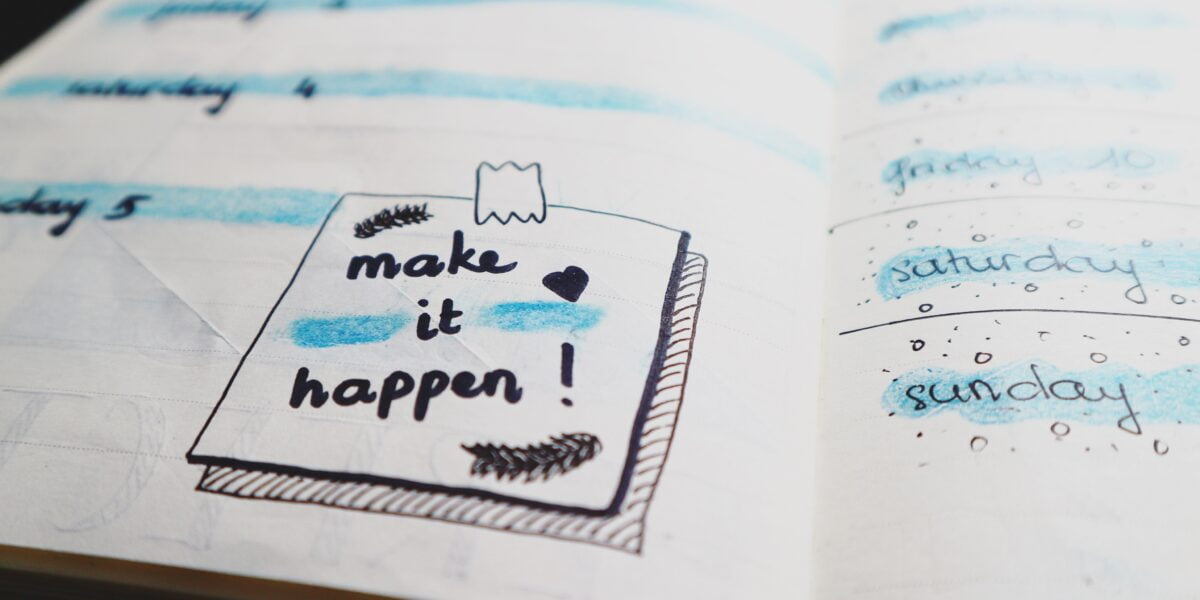The start of a New Year is a time when many of us naturally reflect on the past 12 months and begin to consider how we can make the year ahead just as good, or (in the case of 2020 for most of us), a heck of a lot better! New Year’s ‘resolutions’ often get a bad reputation, associated with expectations of waking up on January 1st a whole new person, with all obstacles from the past year wiped out. Of course, this doesn’t happen and so our initial optimism can quickly diminish and see us falling back into old patterns and habits within weeks or even days. Whilst I truly believe that a New Year is a wonderful opportunity to set some fresh goals, there’s nothing magical about it and you’re certainly no more likely to achieve said goals at this time rather than any other. Below, I’ve shared my top 3 tips to help you set and achieve meaningful goals that are a far cry from the deprivation and ‘all or nothing’ approach we may associate with this time of year.
1. Be careful what you wish for! If I asked you to name the top 3 resolutions made around this time of year, you’d probably guess things such as ‘lose weight,’ ‘reduce alcohol’ and ‘save more money’. You wouldn’t be far wrong as these are some of the most common things we resolve to do and we may even pick more than one of these to achieve in the year ahead. Whilst there is absolutely nothing wrong with any of these goals, it is worth stopping and asking yourself which ones really matter to you? In a society that often values weight loss, material items and striving for perfection in many aspects of our health and lifestyle, we can sometimes find it hard to distinguish between what we actually WANT and what we’re told we SHOULD WANT. It’s highly important to KNOW YOUR WHY and make sure it’s something you truly desire. Don’t resolve to lose weight because a celebrity advertises a certain diet, or to take up running or quit alcohol because it seems to be trending at the moment. Take some time to choose a goal or area that really matters to you and get crystal clear on what it would mean for you to achieve it. It could be that by exercising regularly you’d have more energy to be active with your family, reducing alcohol consumption would help you save money for a holiday and any health anxieties may be eased by making more conscious dietary choices. All of these are more specific and meaningful to you as an individual which will help with motivation when the going gets tough.

2. Start with where you are. Sounds too simple, right?! We can’t really start anywhere else, however many of us pick near enough random goals such as ‘fit in a size X dress’, ‘become vegetarian’ or ‘complete 5 workout classes per week’ without actually considering if they’re feasible for us. Whilst I’m all for aiming high with what you want to achieve, if you’re aiming to get from zero to hero and never slip up you’re undoubtedly setting yourself up for ‘failure’ and falling short. Before you get specific about where you want to get to, you must FIND YOUR POINT A. This means being realistic about exactly where you are right now on your journey towards a goal. How much alcohol are you drinking/ how often? Do you know any meat-free recipes or have you ever tried any substitutes for meat in your meals? Do you workout at all/have you ever run before and so on… Once you know roughly where you are now (point A), you can better assess where you feel you could get to (point Z) in your allocated time scale.
Some ways of doing this include keeping a food/alcohol/spending diary, making a note of what free time you have during a typical week where you could workout and testing some healthier alternatives to foods you commonly eat. This year, one of my main goals is to get back into regular running and increase the distance and time which I can run for. Earlier this week, I went to a nearby field and jogged until I was tired. I’ll be completely honest with you – this didn’t take long! Whilst some amazing people will run marathons this year, complete 5km races in the time it takes me to get my trainers on and be strict enough to get out and run in all weathers – this is not me! I am now clearly aware of my current abilities and obstacles and as a result I have set a challenging, but personalised target for the next 12 months. Just like me, your end point will be much better informed if you do this and you will be much better placed to achieve success.

3. Plan your route. Quite often, achieving goals is referred to as getting from point A to point B and so you may notice that I’ve referred to the destination as point Z. This is because I believe that on route to any goal, there are many milestones along the way and that looking forward to these and celebrating them is a huge factor in how far you will go towards making it to point Z. If you knew you were driving from John o’ Groats to Lands End none-stop, you’d probably be dreading it. You might worry so much about how you’d snack, sleep, pee and everything else you might not even go. Our minds do a great job of talking us out of things that feel too big or too scary and they respond well to smaller tasks and chunks of information. As a result, by planning in a point B,C, D etc. into your journey towards your goal, you will have a much clearer map of how you get to the end point. On days where achieving your goal feels so far out of reach, you can look back at all the small successes and checkpoints you’ve reached along the way and feel encouraged. Additionally, rather than feeling disheartened at how far you’ve got to go and doubting if you can make it, you can focus just on the next small goal. Losing that next pound, preparing that healthy meal, completing your scheduled workout and so on. After all, the way to eat an elephant is one bite at a time! That’s definitely a famous quote by the way, I’ve not just made that up! Make sure that you plan in rewards along the route and things to look forward to. These can literally be anything that works for you such as rest days, foods you enjoy and treats such as days out, new workout gear, a massage or quiet bath.

Let’s be honest – if a new year’s resolution is going to take 12 months of being super strict with yourself, doubting if you’ll ever even achieve what you’re aiming for and questioning if you really care enough to make the sacrifices, chances are you’ll give up sooner rather than later! By planning out a gradual and rewarding approach and knowing exactly why you want to continue on your journey, you’re much more likely to stick with the plan and pick yourself up after any mishaps. A year is a very long time for which to commit to a new habit or lifestyle change, but if you have breaks and moments of relief scheduled in and you only need to think about the next bite of the elephant (or something like that) your goals all of a sudden become much more achievable. You’ve got this!
Beverley Meakin – Personal Trainer/Exercise Referral Officer and Complementary Therapist.
Instagram @happy_healthy_holistically

